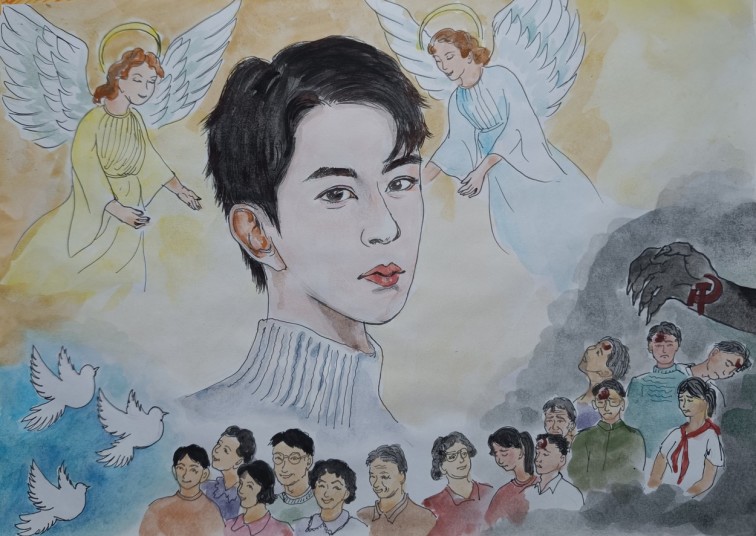Lai Ching-te eating Japanese seafood. (Video screenshot)
[People News] Beijing’s hypersensitive reaction to new Japanese Prime Minister Sanae Takaichi’s statement on the “Taiwan contingency” continues to escalate. Japanese media figures point out that Beijing’s fierce response comes directly from top-level instructions, but stirring up anti-Japanese sentiment is a “double-edged sword”—if protests break out, the CCP will end up hurting itself.
Japanese Prime Minister Sanae Takaichi’s remarks about a “Taiwan contingency” infuriated the Chinese Communist Party (CCP), prompting the CCP to immediately launch a series of retaliatory measures, including discouraging tourism to Japan and once again suspending imports of Japanese seafood. CCP mouthpiece Xinhua News Agency even boasted that group tours from China to Japan are now being canceled en masse, claiming Japan’s tourism industry is “having a hard time.”
However, the report was mocked by Chinese netizens. Some commented, “We’re the ones suffering the most,” while others quipped, “North Korean news says every day that South Korea and the U.S. are having a hard time.”
According to Liberty Times, CCP mouthpiece Xinhua wrote yesterday that Japan’s tourism industry took a major hit in the latest wave of tensions, as Chinese tour groups experienced a surge in cancellations, with the cancellation rate rising to more than 70%. Hokkaido, the primary winter destination for Chinese tourists, has been especially affected. Local business owners said that this should be their peak season, yet they have received no orders and don’t know what to do.
However, the report appears unconvincing to Chinese netizens. On China’s search engine Baidu, in the real-time discussion overlay under related news, netizens commented: “We’re the ones having the hardest time… Over 50% of Japanese homestays and chartered tour vehicles are run by Chinese people,” “North Korean news says every day that South Korea and the U.S. are having a hard time,” “Why do the reports I see show Japanese people being happy?” “Chinese airlines are also taking a hit,” “Go out and see for yourself whether it’s actually raining outside.”
Other netizens mocked: “Haven’t we seen this enough? Just wait—if Japan lowers prices, people will be scrambling to go again.” Another rebutted: “Japan is not having a hard time. A domestic big V recently estimated that if every single person in mainland China stopped visiting Japan for a whole year, the impact on Japan’s GDP would be about 0.36%. The main consumer base for Japanese tourism is not from the mainland. With fewer people going on budget tours and loitering on the streets, who’s really losing out? Anyone with clarity can see that.”
While the CCP is angrily pumping out anti-Japanese propaganda—shouting slogans like “the gun is loaded and the sword is unsheathed”—on the other side of the Taiwan Strait, President Lai Ching-te of the Republic of China (Taiwan) was all smiles as he enjoyed Japanese sushi, even posting photos on Facebook, causing a stir.
Regarding the CCP’s anti-Japanese moves, Japanese media observers note that the CCP’s strong reactions come from the top leadership, but inciting anti-Japanese sentiment is a “double-edged sword”—if protests erupt, the CCP will be harmed.
According to Taiwanese media reports, on November 20, President Lai Ching-te posted on Facebook, Instagram, Threads, and X, writing: “Today’s lunch was sushi and miso soup,” with “sea bream from Kagoshima and scallops from Hokkaido.” This caught international media attention. Reports about Lai eating sushi appeared in Japan’s subway via Kyodo News, and also appeared on NHK, CBS, Reuters, and other outlets.
On November 18, Japan’s Minister for Economic Security, Noriko Ohnoda, commented at a press conference on China’s call for its citizens to avoid traveling to Japan, saying: “It is a risk to rely too heavily on a country that immediately resorts to economic intimidation whenever it is dissatisfied.” She added, “Everyone should always consider how to reduce risks while promoting economic development.”
Responding to the CCP’s intimidation tactics, veteran Japanese journalist Koji Nakazawa, who worked in China for seven years, wrote on November 20 that worsening Japan–China relations and Beijing’s recent series of intense reactions stem from top-level directives. In the past, the CCP often incited anti-Japanese protests in response to what it viewed as problematic Japanese actions. But today, this unique diplomatic weapon—stirring up protests—has become a double-edged sword that may backfire on Xi Jinping’s administration.
From August to September 2012, tensions over the Senkaku Islands escalated. Massive anti-Japanese protests erupted in Beijing and spread across China, with some Japanese businesses and factories being damaged.
Nakazawa noted that in 2012, the CCP had relatively little difficulty controlling protesters because the actions were orchestrated under its direction. But today’s China is completely different: real-estate prices continue to fall into negative equity, Chinese people must tighten their belts, and youth unemployment remains high.
He believes that under such conditions, if the CCP allows anti-Japanese protests, the demonstrations could spread nationwide like wildfire and, once out of control, turn into anti-government protests. People are deeply frustrated by severe economic hardship and need to vent long-accumulated resentment.
Renowned political commentator Cao Changqing previously noted that stirring up or suppressing anti-Japanese sentiment has become a tool the CCP uses to consolidate power—inciting it when needed, shutting it down when not. This shows the extreme weakness of the regime, which depends on such thuggish tactics to maintain control.
Japanese scholars recommend that PM Sanae Takaichi adopt three countermeasures:
besides filing a complaint with the WTO, Japan should also aggressively seek alternative markets outside China. The most powerful move would be facilitating Taiwan’s entry into the CPTPP ahead of China, pressuring Beijing to return to the negotiating table. Japanese media say this is the scenario Xi Jinping fears most. △











News magazine bootstrap themes!
I like this themes, fast loading and look profesional
Thank you Carlos!
You're welcome!
Please support me with give positive rating!
Yes Sure!